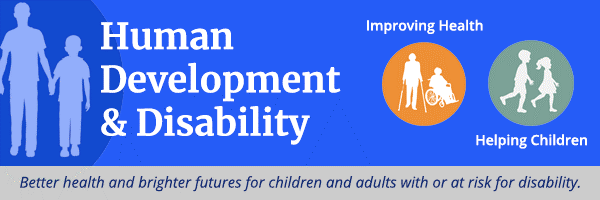DHDD Newsletter – November/December 2018

In the midst of the holiday season, I can’t help but be grateful for the meaningful partnerships that DHDD has. Our shared mission to improve the lives of people of all ages with, or at risk for, disabilities is important to the health and wellbeing of our society. We have accomplished so much together, and we are making a difference!
Have a safe and happy holiday!
– Dr. Georgina Peacock, Director, DHDD
dhdddirector@cdc.gov
EHDI State Awardee Meeting
In mid-November, DHDD’s Early Hearing Detection and Intervention (EHDI) team brought together a subset of its state programs for an annual meeting in Atlanta to network with other programs and learn from each other’s successes and opportunities. Participants discussed potential process innovations to improve the quality and analysis of EHDI data. For all the information on CDC’s EHDI State Programs, click here.
Policy Academy Graduates
Valerie Godoshian, Natalie Street, Elizabeth Walker and Rachel Robb, all members of the DHDD extended team, will soon graduate from The CDC Policy Academy. This is a highly-selective training program that strengthens participants’ abilities to apply policy as a lever to improve public health. Over the past year, this team of talented women focused their efforts on understanding successful transition of youth with special health care needs from pediatric to adult health care. They examined policies from state programs, specialty clinics, and health systems to understand how providers are putting transition plans to use in their practices. Congratulations!

International Day of Persons with Disabilities
December 3 was International Day of Persons with Disabilities, hosted by the United Nations. The day “aims to promote the rights and well-being of persons with disabilities in all spheres of society and development, and increase awareness” across the globe. This year’s theme is “Empowering persons with disabilities and ensuring inclusiveness and equality.” DHDD shared a CDC feature about what some of our partners are doing in their communities to make them more inclusive for people with disabilities. Check it out!
Please visit the Disability and Health Data System (DHDS) to find the data that can help you improve the health of people with disabilities in your state, and take this short survey to let us know about your experience.



